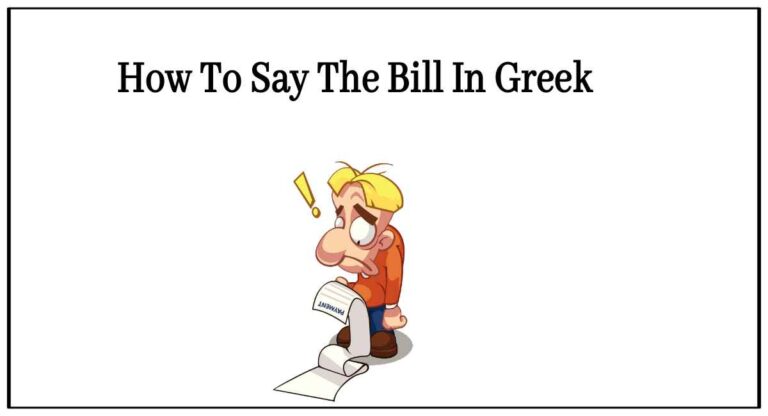How Do You Say No In Greek Letters {Audio}
Greek is a language rich in history, culture, and expression, known for its beautiful script and melodious sounds. As we delve into the nuances of this ancient language, one question arises: How do you say no in Greek?
From the written form to pronunciation and even audio examples, this article will guide you through the various ways to express refusal in Greek. Whether you’re a language enthusiast or planning a trip to Greece, understanding how to say no is essential for effective communication in this mesmerizing Mediterranean tongue.
So, let’s explore the different facets of saying no in Greek and unlock the secrets of its linguistic landscape.
How Do You Say No In Greek
To express a negative response or say “No” in Greek, you use the word “Όχι” (Óchi). Here’s a detailed explanation:
Όχι (Óchi):
- Pronunciation: OH-khee
- Meaning: “Όχι” (Óchi) is the straightforward and commonly used way to express a negative response or decline something in Greek. It is equivalent to “No” in English and indicates the opposite of agreement or affirmation.
- Usage: This word is versatile and suitable for various situations, whether you want to decline an offer, answer a negative question, or state a negative response. It’s the standard and universally understood way to say “No” in Greek.
- Context: You can use “Όχι” in everyday interactions, such as when you want to decline an invitation, refuse something politely, or respond negatively to a question. It’s a fundamental word for clear and concise communication in Greek culture.
Learning and using “Όχι” is essential for expressing negation and clarifying your intentions when you need to decline or say “No” in Greek. It’s a straightforward and widely recognized term in the Greek language.
How Do You Say No In Greek Letters
To write “No” in Greek letters, you use the word “Όχι” (Óchi) as follows:
Όχι (Óchi):
- Greek Script: Όχι
- Transliteration: Óchi
- Pronunciation: OH-khee
In the Greek alphabet, each letter corresponds to a specific sound, and “Όχι” (Óchi) is written using these Greek letters: Ό (omicron), χ (chi), and ι (iota). Learning how to write and recognize this word in Greek letters is useful for reading and writing in Greek. “Όχι” is the standard and universally understood way to write “No” in Greek.
Yes” And No” In Greek
In the Greek language, “Yes” is expressed as “Ναι” (Nai), and “No” is conveyed as “Όχι” (Óchi). Here’s a detailed explanation:
Ναι (Nai):
- Pronunciation: nay
- Meaning: “Ναι” (Nai) is the equivalent of “Yes” in English. It is used to affirm or agree with a statement, question, or proposal. When you want to express consent, approval, or confirmation, you use “Ναι.”
- Usage: This word is versatile and suitable for a wide range of situations, whether you are answering a question, accepting an offer, or simply agreeing with someone’s statement. It is a fundamental and universally understood word for positive responses in Greek.
Όχι (Óchi):
- Pronunciation: OH-khee
- Meaning: “Όχι” (Óchi) is the Greek counterpart of “No” in English. It is used to indicate the opposite of agreement or to decline or negate something. When you want to express disagreement, refusal, or a negative response, you use “Όχι.”
- Usage: “Όχι” is versatile and can be used in various contexts where you need to respond negatively. Whether you are declining an invitation, refusing something, or answering a negative question, “Όχι” is the standard and widely recognized way to express “No” in Greek.
These two simple words, “Ναι” and “Όχι,” are crucial for clear and concise communication in the Greek language. They allow you to express agreement or disagreement effectively and are universally understood in Greek-speaking environments.
How Do You Say No In Greek Pronunciation
To pronounce “No” in Greek, you use the word “Όχι” (Óchi). Here’s a detailed explanation of its pronunciation:
Όχι (Óchi):
- Pronunciation: OH-khee
- Breakdown: Let’s break down the pronunciation step by step:
- The first letter, “Ό” (omicron), is pronounced like the “o” in “orange.”
- The next letter, “χ” (chi), is pronounced like a guttural “kh” sound, similar to the Scottish “loch” or the Hebrew “ch” in “Chanukah.”
- The final letter, “ι” (iota), is pronounced like the “ee” in “see.”
When you put these sounds together, you get “Όχι” (Óchi), pronounced OH-khee. The emphasis or stress in the word is typically on the second syllable, which is the “χι” (khi) part. So, it’s pronounced OH-khee, with a slight emphasis on the “khee” part.
Learning the pronunciation of “Όχι” is essential for effectively conveying a negative response or declining something in the Greek language.
How Do You Say No In Greek Audio
A common way to express gratitude in Greek is by saying efcharistó (ευχαριστώ). This word carries the weight of sincere appreciation and can be used in various contexts, from expressing gratitude for a simple favor to thanking someone for a life-changing opportunity. The pronunciation may seem challenging at first glance, but fear not – with a little practice, you’ll say it confidently.
Click here to listen to the audio pronunciation:
Όχι Audio
As you become more familiar with Greek, you’ll discover additional ways to say thank you, depending on the situation. For instance, if you want to show greater appreciation or politeness, you can use phrases like polú efcharistó (πολύ ευχαριστώ) which means thank you very much. Alternatively, if someone goes above and beyond for you, a heartfelt s’eyxaristó polí (σε ευχαριστώ πολύ), meaning I thank you greatly, will reflect your deep gratitude. So go ahead and immerse yourself in the richness of the Greek language – everyone loves being thanked!
Conclusion Points
In conclusion, saying no in Greek can be tricky due to the different variations and contexts. However, familiarizing yourself with the Greek word for no, όχι, and learning how to pronounce it correctly will help you navigate conversations in Greece.
It’s also important to understand that non-verbal cues such as shaking your head or crossing your arms can indicate a negative response. So whether you’re planning a trip to Greece or simply interested in learning the language, practice saying no in Greek and immerse yourself in the rich linguistic culture of this ancient country.
FAQs
1. How do you say no in Greek?
– The word for no in Greek is όχι (óchi).
2. How do you say no in Greek letters?
– In Greek letters, no is written as οχι.
3. How do you say yes and no in Greek?
– The word for yes in Greek is ναι (né). Additionally, as mentioned before, the word for no is όχι.
4. How do you pronounce no in Greek?
– The pronunciation of no in Greek is [ˈɔçi].
5. How do you say no in Greek slang?
– In Greek slang, people often use the term “μπα” (ba) to mean “no.”
6. Are there any alternative ways to express denial or refusal in Greek?
– Yes, apart from using the straightforward word for “no,” Greeks may also use phrases like “δεν γίνεται” (den gínetai), meaning “it’s not possible” or “απορρίπτω” (aporípto) meaning “I reject.”
7. Can I use gestures to indicate a negative response in Greece?
– Yes, raising your hand with your palm facing outward and shaking it slightly side to side can indicate a negative response like saying “no.”
8. Are there any cultural considerations when saying no in Greece?
– Yes, it’s important to be polite and respectful when saying no in Greece, as Greeks value hospitality and politeness. Using words such as “συγνώμη” (signómi), meaning “sorry” before declining can help soften the impact of saying no.






